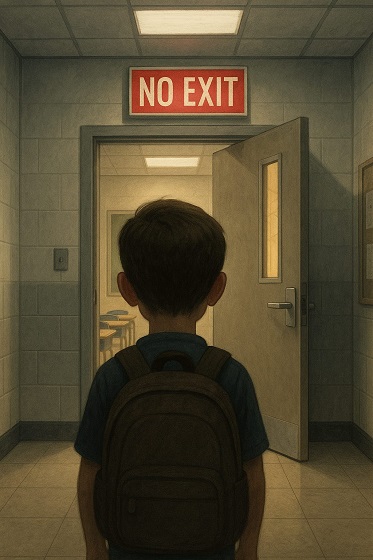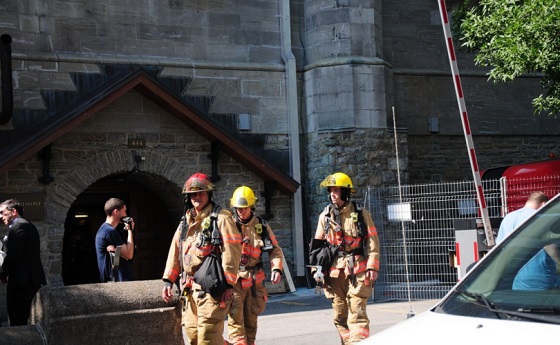Business
Tariff-driven increase of U.S. manufacturing investment would face dearth of workers

From the Fraser Institute
Since 2015, the number of American manufacturing jobs has actually risen modestly. However, as a share of total U.S. employment, manufacturing has dropped from 30 per cent in the 1970s to around 8 per cent in 2024.
Donald Trump has long been convinced that the United States must revitalize its manufacturing sector, having—unwisely, in his view—allowed other countries to sell all manner of foreign-produced manufactured goods in the giant American market. As president, he’s moved quickly to shift the U.S. away from its previous embrace of liberal trade and open markets as cornerstones of its approach to international economic policy —wielding tariffs as his key policy instrument. Since taking office barely two months ago, President Trump has implemented a series of tariff hikes aimed at China and foreign producers of steel and aluminum—important categories of traded manufactured goods—and threatened to impose steep tariffs on most U.S. imports from Canada, Mexico and the European Union. In addition, he’s pledged to levy separate tariffs on imports of automobiles, semi-conductors, lumber, and pharmaceuticals, among other manufactured goods.
In the third week of March, the White House issued a flurry of news releases touting the administration’s commitment to “position the U.S. as a global superpower in manufacturing” and listing substantial new investments planned by multinational enterprises involved in manufacturing. Some of these appear to contemplate relocating manufacturing production in other jurisdictions to the U.S., while others promise new “greenfield” investments in a variety of manufacturing industries.
President Trump’s intense focus on manufacturing is shared by a large slice of America’s political class, spanning both of the main political parties. Yet American manufacturing has hardly withered away in the last few decades. The value of U.S. manufacturing “output” has continued to climb, reaching almost $3 trillion last year (equal to 10 per cent of total GDP). The U.S. still accounts for 15 per cent of global manufacturing production, measured in value-added terms. In fact, among the 10 largest manufacturing countries, it ranks second in manufacturing value-added on a per-capita basis. True, China has become the world’s biggest manufacturing country, representing about 30 per cent of global output. And the heavy reliance of Western economies on China in some segments of manufacturing does give rise to legitimate national security concerns. But the bulk of international trade in manufactured products does not involve goods or technologies that are particularly critical to national security, even if President Trump claims otherwise. Moreover, in the case of the U.S., a majority of two-way trade in manufacturing still takes place with other advanced Western economies (and Mexico).
In the U.S. political arena, much of the debate over manufacturing centres on jobs. And there’s no doubt that employment in the sector has fallen markedly over time, particularly from the early 1990s to the mid-2010s (see table below). Since 2015, the number of American manufacturing jobs has actually risen modestly. However, as a share of total U.S. employment, manufacturing has dropped from 30 per cent in the 1970s to around 8 per cent in 2024.
| U.S. Manufacturing Employment, Select Years (000)* | |
|---|---|
| 1990 | 17,395 |
| 2005 | 14,189 |
| 2010 | 14,444 |
| 2015 | 12,333 |
| 2022 | 12,889 |
| 2024 | 12,760 |
| *December for each year shown. Source: U.S. Bureau of Labor Statistics | |
Economists who have studied the trend conclude that the main factors behind the decline of manufacturing employment include continuous automation, significant gains in productivity across much of the sector, and shifts in aggregate demand and consumption away from goods and toward services. Trade policy has also played a part, notably China’s entry into the World Trade Organization (WTO) in 2001 and the subsequent dramatic expansion of its role in global manufacturing supply chains.
Contrary to what President Trump suggests, manufacturing’s shrinking place in the overall economy is not a uniquely American phenomenon. As Harvard economist Robert Lawrence recently observed “the employment share of manufacturing is declining in mature economies regardless of their overall industrial policy approaches. The trend is apparent both in economies that have adopted free-market policies… and in those with interventionist policies… All of the evidence points to deep and powerful forces that drive the long-term decline in manufacturing’s share of jobs and GDP as countries become richer.”
This brings us back to the president’s seeming determination to rapidly ramp up manufacturing investment and production as a core element of his “America First” program. An important issue overlooked by the administration is where to find the workers to staff a resurgent U.S. manufacturing sector. For while manufacturing has become a notably “capital-intensive” part of the U.S. economy, workers are still needed. And today, it’s hard to see where they will be found. This is especially true given the Trump administration’s well-advertised skepticism about the benefits of immigration.
According to the U.S. Bureau of Labor Statistics, the current unemployment rate across America’s manufacturing industries collectively stands at a record low 2.9 per cent, well below the economy-wide rate of 4.5 per cent. In a recent survey by the National Association of Manufacturers, almost 70 per cent of American manufacturers cited the inability to attract and retain qualified employees as the number one barrier to business growth. A cursory look at the leading industry trade journals confirms that skill and talent shortages remain persistent in many parts of U.S. manufacturing—and that shortages are destined to get worse amid the expected significant jump in manufacturing investment being sought by the Trump administration.
As often seems to be the case with Trump’s stated policy objectives, the math surrounding his manufacturing agenda doesn’t add up. Manufacturing in America is in far better shape than the president acknowledges. And a tariff-driven avalanche of manufacturing investment—should one occur—will soon find the sector reeling from an unprecedented human resource crisis.
Jock Finlayson
Senior Fellow, Fraser Institut
Business
P.E.I. Moves to Open IRAC Files, Forcing Land Regulator to Publish Reports After The Bureau’s Investigation

Following an exclusive report from The Bureau detailing transparency concerns at Prince Edward Island’s land regulator — and a migration of lawyers from firms that represented the Buddhist land-owning entities the regulator had already probed — the P.E.I. Legislature has passed a new law forcing the Island Regulatory and Appeals Commission (IRAC) to make its land-investigation reports public.
The bill — introduced by Green Party Leader Matt MacFarlane — passed unanimously on Wednesday, CTV News reported. It amends the Lands Protection Act to require IRAC to table final investigation reports and supporting documents in the Legislature within 15 days of completion.
MacFarlane told CTV the reform was necessary because “public trust … is at an all-time low in the system,” adding that “if Islanders can see that work is getting done, that the (LPA) is being properly administered and enforced, that will get some trust rebuilt in this body.”
The Bureau’s report last week underscored that concern, showing how lawyers from Cox & Palmer — the firm representing the Buddhist landholders — steadily moved into senior IRAC positions after the regulator quietly shut down its mandated probe into those same entities. The issue exploded this fall when a Legislative Committee subpoena confirmed that IRAC’s oft-cited 2016–2018 investigation had never produced a final report at all.
There have been reports, including from CBC, that the Buddhist landholders have ties to a Chinese Communist Party entity, which leaders from the group deny.
In the years following IRAC’s cancelled probe into the Buddhist landholders, The Bureau reported, Cox & Palmer’s general counsel and director of land joined IRAC, and the migration of senior former lawyers culminated this spring, with former premier Dennis King appointing his own chief of staff, longtime Cox & Palmer partner Pam Williams, as IRAC chair shortly after the province’s land minister ordered the regulator to reopen a probe into Buddhist landholdings.
The law firm did not respond to questions, while IRAC said it has strong measures in place to guard against any conflicted decision-making.
Reporting on the overall matter, The Bureau wrote that:
“The integrity of the institution has, in effect, become a test of public confidence — or increasingly, of public disbelief. When Minister of Housing, Land and Communities Steven Myers ordered IRAC in February 2025 to release the 2016–2018 report and reopen the investigation, the commission did not comply … Myers later resigned in October 2025. Days afterward, the Legislative Committee on Natural Resources subpoenaed IRAC to produce the report. The commission replied that no formal report had ever been prepared.”
The Bureau’s investigation also showed that the Buddhist entities under review control assets exceeding $480 million, and there is also a planned $185-million campus development in the Town of Three Rivers, citing concerns that such financial power, combined with a revolving door between key law firms, political offices and the regulator, risks undermining confidence in P.E.I.’s land-oversight regime.
Wednesday’s new law converts the expectation for transparency at IRAC, voiced loudly by numerous citizens in this small province of about 170,000, into a statutory obligation.
Housing, Land and Communities Minister Cory Deagle told CTV the government supported the bill: “We do have concerns about some aspects of it, but the main principles of what you’re trying to achieve are a good thing.”
The Bureau is a reader-supported publication.
To receive new posts and support my work, consider becoming a free or paid subscriber.
Business
Mark Carney Seeks to Replace Fiscal Watchdog with Loyal Lapdog

After scathing warnings from interim budget officer Jason Jacques, Liberals move to silence dissent and install a compliant insider with “tact and discretion.”
It’s remarkable, isn’t it? After a decade of gaslighting Canadians about their so-called “fiscally responsible” governance, the Liberal Party, now under the direction of Mark Carney, finally runs into a problem they can’t spin: someone told the truth. Jason Jacques, the interim Parliamentary Budget Officer, was appointed for six months, six months. And within weeks, he did something this government considers a fireable offense: he read the books, looked at the numbers, and spoke plainly. That’s it. His crime? Honesty.
Here’s what he found. First, the deficit. Remember when Trudeau said “the budget will balance itself”? That myth has now mutated into a projected $68.5 billion deficit for 2025–26, up from $51.7 billion the year before. Jacques didn’t just disagree with it. He called it “stupefying,” “shocking,” and, this is the one they hate the most, “unsustainable.” Because if there’s one thing Ottawa elites can’t handle, it’s accountability from someone who doesn’t need a job after this.
But Jacques didn’t stop there. He pointed out that this government has no fiscal anchor. None. Not even a fake one. A fiscal anchor is a target, like a deficit limit or a falling debt-to-GDP ratio—basic stuff for any country pretending to manage its money. Jacques said the Liberals have abandoned even that pretense. In his words, there’s no clear framework. Just blind spending. No roadmap. No compass. No brakes.
And speaking of GDP, here’s the kicker: the debt-to-GDP ratio, which Trudeau once swore would always go down, is now heading up. Jacques projects it rising from 41.7% in 2024–25 to over 43% by 2030–31. And what happens when debt rises and growth slows? You pay more just to service the interest. That’s exactly what Jacques warned. He said the cost of carrying the debt is eating into core government operations. That means fewer services. Higher taxes. Slower growth. The burden gets passed to your children while Mark Carney gives another speech in Zurich about “inclusive capitalism.”
And let’s talk about definitions. Jacques flagged that the Liberals are now muddying the waters on what counts as operating spending versus capital spending. Why does that matter? Because if you redefine the terms, you can claim to be balancing the “operating budget” while secretly racking up long-term debt. It’s accounting gimmickry, a shell game with your tax dollars.
He also pointed to unaccounted spending, about $20 billion a year in campaign promises that haven’t even been formally costed yet. Add that to their multi-decade defense commitments, green subsidies, and inflated federal payroll, and you’re looking at an avalanche of unmodeled liabilities.
And just to make this circus complete, Jacques even criticized the way his own office was filled. The Prime Minister can handpick an interim PBO with zero parliamentary input. No transparency. No debate. Just a quiet appointment, until the appointee grows a spine and tells the public what’s really going on.
Now the Liberals are racing to replace Jacques. Why? Because he said all of this publicly. Because he didn’t play ball. Because his office dared to function as it was intended: independently. They’re looking for someone with “tact and discretion.” That’s what the job listing says. Not independence. Not integrity. Tact. Discretion. In other words: someone who’ll sit down, shut up, and nod politely while Carney and Champagne burn through another $100 billion pretending it’s “investment.”
Let’s be clear: this isn’t just about replacing a bureaucrat. It’s about neutering the last shred of fiscal oversight left in Ottawa. The Parliamentary Budget Officer is supposed to be a firewall between reckless political ambition and your wallet. But in Carney’s Canada, independence is an inconvenience. So now, instead of extending Jacques’ term, something that would preserve continuity and show respect for accountability, the Liberals are shopping for a compliant technocrat. Someone who won’t call a $68.5 billion deficit “stupefying.” Someone who’ll massage the numbers just enough to keep the illusion intact.
They don’t want an economist. They want a courtier. Someone with just enough credentials to fake credibility, and just enough cowardice to keep their mouth shut when the spending blows past every so-called “anchor” they once pretended to respect. That’s the game. Keep the optics clean. Keep the watchdog muzzled. And keep Canadians in the dark while this government drives the country off a fiscal cliff.
But let me say it plainly, thank god someone in this country still believes in accountability. Thank God Jason Jacques stepped into that office and had the guts to tell the truth, not just to Parliament, but to the Canadian people. And thank God Pierre Poilievre has the common sense, the spine, and the clarity to back him. While Mark Carney and his Laurentian elite pals are busy gutting oversight, rewriting the rules, and flooding the economy with borrowed billions, it’s men like Jacques who refuse to play along. He looked at the books and didn’t see “investment”—he saw a ticking fiscal time bomb. And instead of ducking, he sounded the alarm.
Poilievre, to his credit, is standing firmly behind the man. He understands that without a real watchdog, Parliament becomes a stage play, just actors and scripts, no substance. Backing Jacques isn’t just good politics. It’s basic sanity. It’s the minimum standard for anyone who still thinks this country should live within its means, tell the truth about its finances, and respect the people footing the bill.
So while the Liberals scramble to muzzle dissent and hire another smiling yes-man with a resume full of buzzwords and a Rolodex full of Davos invites, at least one opposition leader is saying: No. We need a watchdog, not a lapdog. And in a city full of spineless bureaucrats, that’s not just refreshing—it’s absolutely essential.
-

 Business2 days ago
Business2 days agoCarney shrugs off debt problem with more borrowing
-

 Alberta2 days ago
Alberta2 days agoWhen Teachers Say Your Child Has Nowhere Else to Go
-

 Addictions2 days ago
Addictions2 days agoCanada is divided on the drug crisis—so are its doctors
-

 Bruce Dowbiggin2 days ago
Bruce Dowbiggin2 days agoMaintenance Mania: Since When Did Pro Athletes Get So Fragile?
-

 Automotive2 days ago
Automotive2 days agoThe high price of green virtue
-

 MAiD2 days ago
MAiD2 days agoQuebec has the highest euthanasia rate in the world at 7.4% of total deaths
-

 Daily Caller2 days ago
Daily Caller2 days agoProtesters Storm Elite Climate Summit In Chaotic Scene
-

 National1 day ago
National1 day agoConservative bill would increase penalties for attacks on places of worship in Canada












